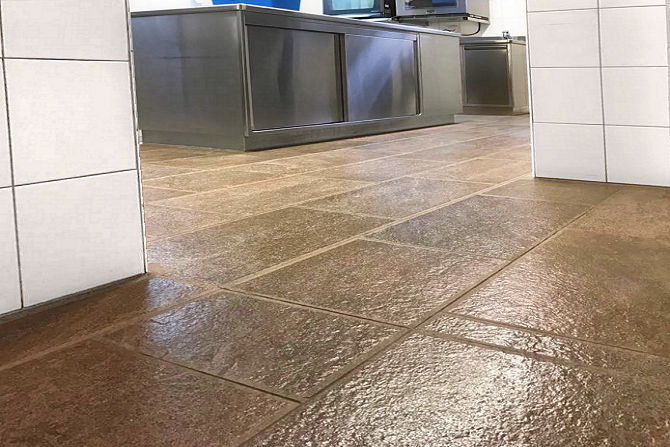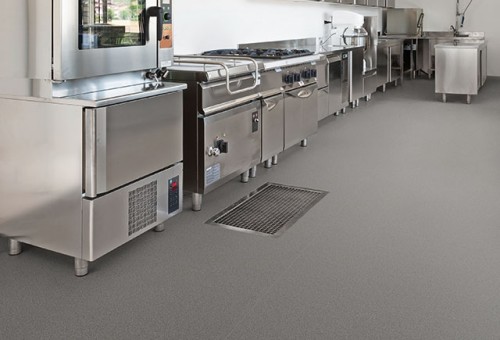Imagine this: you’re rushing to grab a steaming plate of your restaurant’s signature dish for a hungry customer. Your feet slip on the slick kitchen floor, sending you sprawling into a chaotic mess of spilled sauces and broken dishes. This isn’t just a comical anecdote; it’s a very real hazard faced by countless workers in busy commercial kitchens. Maintaining a safe kitchen floor is paramount, and that’s where non-slip floor tiles come into play.

Image: www.grip-antirutsch.com
More than just preventing embarrassing spills and mishaps, non-slip floor tiles are crucial for a safe and efficient kitchen environment. They protect valuable staff from injuries and ensure the smooth flow of operations, minimizing disruption and accidents. As you delve into the world of kitchen flooring, you’ll discover a diverse range of options, each with unique advantages. Join us as we explore the essential aspects of choosing the right non-slip tiles for your commercial kitchen, keeping safety, aesthetics, and functionality at the forefront.
Understanding the Importance of Non-Slip Flooring in Commercial Kitchens
Essential for Safety and Efficiency
The kitchen floor is the heart of any foodservice operation. It’s a high-traffic area where staff constantly move around, transporting ingredients, preparing meals, and serving customers. This constant activity increases the risk of slips, trips, and falls, particularly in environments with spills, splashing water, and grease. Non-slip tile flooring plays a crucial role in mitigating these risks.
Beyond preventing accidents, non-slip tiles contribute to a safe and efficient kitchen environment. When staff feel confident and secure on the floor, they can focus on their tasks without worrying about slipping. This increased efficiency translates into smoother operations and faster service, ultimately enhancing customer satisfaction.
Factors Influencing Slip Resistance
The slip resistance of a tile is measured by its coefficient of friction (COF), a value that indicates the amount of friction between the tile surface and a shoe. A higher COF indicates greater slip resistance. The COF of a tile can be influenced by several factors:
- Tile Material: Different materials have varying levels of inherent slip resistance. For instance, textured ceramic tiles tend to be more slip-resistant than smooth polished tiles.
- Surface Texture: The surface texture of a tile plays a significant role in its slip resistance. Tiles with rough, textured surfaces provide more grip than smooth, polished surfaces.
- Glaze: Glazed tiles can be slippery, especially when wet. Unglazed tiles, on the other hand, often have a textured surface that enhances slip resistance.
- Grout: Grout lines can also contribute to a tile’s slip resistance. Using a textured grout or a grout with a high COF helps improve overall grip.

Image: www.polyflor.com.au
Types of Non-Slip Floor Tiles for Commercial Kitchens
The market offers a wide array of non-slip floor tiles suitable for commercial kitchens. Here are some popular options:
- Ceramic Tiles: Ceramic tiles are durable, easy to clean, and available in various colors and patterns. Textured ceramic tiles, glazed or unglazed, are ideal for high-traffic and wet areas.
- Porcelain Tiles: Porcelain tiles are known for their exceptional durability and water resistance. They are available in a wide range of finishes, including textured and non-slip options.
- Stone Tiles: Natural stone tiles, such as granite, marble, and slate, offer elegant aesthetics and durability. However, some stone tiles can be slippery when wet. Choosing textured stone tiles or applying a non-slip sealant can enhance their safety.
- Rubber Tiles: Rubber tiles provide excellent slip resistance, even in wet conditions. They are durable, comfortable underfoot, and offer good sound dampening properties.
- Epoxy Tiles: Epoxy tiles are a highly durable and hygienic option, suitable for high-traffic areas. They offer excellent slip resistance, ease of cleaning, and resistance to stains and chemicals.
Factors to Consider When Choosing Non-Slip Tiles
When selecting non-slip tiles for your commercial kitchen, consider the following factors:
- Slip Resistance: Choose tiles with a high enough COF to ensure adequate slip resistance in your specific kitchen environment. Consult with a flooring specialist to determine the appropriate COF for your needs.
- Durability: Commercial kitchens experience heavy foot traffic, spills, and cleaning chemicals. Choose tiles that can withstand these challenges while maintaining their durability and slip resistance.
- Aesthetics: While safety is paramount, aesthetics also matter in a commercial kitchen. Choose tiles that complement the overall design and create a welcoming environment for staff and customers.
- Maintenance: Certain tiles require specific cleaning procedures. Choose tiles that are easy to maintain and clean without compromising their slip resistance.
- Budget: Tile prices vary considerably depending on the material, size, and design. Set a budget before starting your research to stay within your financial constraints.
Expert Tips for Selecting Non-Slip Floor Tiles
Focus on the Right Slip Resistance
When it comes to slip resistance, more isn’t always better. While a high COF is important, excessive texturing can make the floor uncomfortable to walk on and increase the risk of tripping hazards, especially for staff carrying bulky equipment. It’s essential to find a balance between slip resistance and comfort.
Think Beyond the Tile
While tile selection is crucial, don’t overlook the supporting elements, such as the grout and installation. Textured grout can significantly enhance slip resistance, especially for tiles with a smoother finish. Ensuring proper installation is also crucial to maximize the tile’s slip resistance. This includes using a level surface, installing the tiles correctly, and providing adequate support.
Invest in Maintenance
Once you install your non-slip tiles, it’s essential to maintain them regularly. Cleaning spills promptly, using appropriate cleaning solutions, and applying non-slip sealants can help preserve the tile’s slip resistance and extend its lifespan. Hiring a professional cleaning service for regular deep cleaning can ensure your kitchen floors stay safe and clean for years to come.
FAQ: Non-Slip Floor Tiles for Commercial Kitchens
Q: How often should I replace my non-slip floor tiles?
A: The lifespan of your non-slip floor tiles depends on the material, foot traffic, and maintenance practices. However, most commercial kitchen tiles can last for 10-15 years with proper care. Regularly inspecting them for wear and tear, repairing any cracks or damage, and applying sealants can help extend their lifespan.
Q: Can I make my existing floor tiles non-slip?
A: You can often improve the slip resistance of your existing tiles by applying a non-slip sealant. These sealants create a textured surface that enhances grip and can be applied to various tile types, including ceramic, porcelain, and stone. However, always test a sealant on a small, inconspicuous area of your tile first to ensure compatibility and desired results.
Non Slip Floor Tiles For Commercial Kitchen
Conclusion
As you navigate the world of non-slip floor tiles for your commercial kitchen, remember that safety, aesthetics, and functionality are all interconnected. Choosing the right tiles requires careful consideration of slip resistance, durability, aesthetics, and maintenance requirements. By investing in high-quality non-slip tiles and implementing a proactive maintenance plan, you can create a safe, efficient, and welcoming environment for your staff and customers.
Are you considering upgrading your commercial kitchen flooring? Tell us about your experience and challenges in the comments below!



/GettyImages-173599369-58ad68f83df78c345b829dfc.jpg?w=740&resize=740,414&ssl=1)


